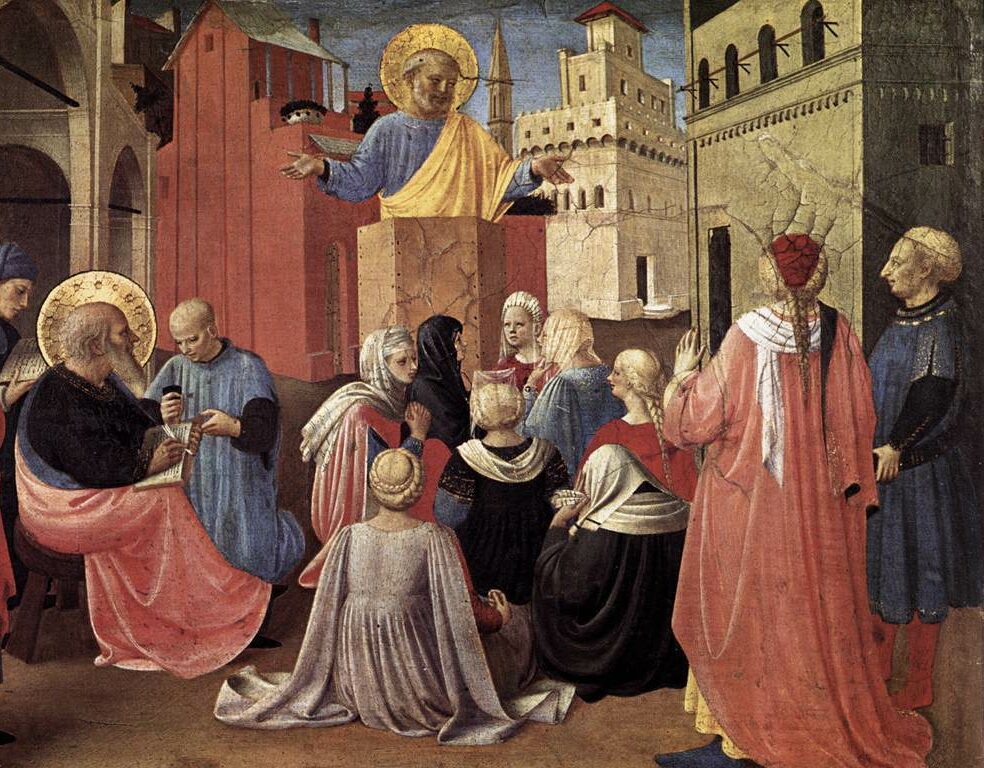I mentioned in my last post that some have described the Easter season as a journey. Over the last several weeks, we’ve moved out away from the initial joy of the empty tomb, the Easter lilies, and the Alleluias, and have instead focused on what it’s like for us without Christ here. And so, here we are, on the other side of Pentecost. We have come to the end of the Easter Road. Or, as I said in my last post, what if we think of this as just the beginning? As we move out beyond the experience of Pentecost, the 5oth day of Eastertide, we move into the long, green season that is simply known as the Season after Pentecost. And this post-Pentecost season is half of our liturgical year. It will not end until sometime in late November.
It’s necessary at this juncture for us to take stock of what it’s like as we live into what a friend of mine calls the presence of the absence of the risen Lord. What is this life like in light of Pentecost, in terms of the day-to-day lives of Christ’s followers?
The event of Pentecost informs what our life after Pentecost is like. Luke begins his account by telling us that the disciples were all together on Pentecost. There’s the gift of community. While they were together, the Holy Spirit descended upon them like fire, and it filled them completely with an exuberance and zeal, such that they went forth into the streets and began to proclaim the Gospel of Jesus Christ.
While they were speaking in those various languages, what they were proclaiming were God’s deeds of power, the salvific work of Jesus Christ, which is really interesting, if one considers the way the modern church as a whole tends to approach evangelism — the fact that, in spite of this evidence as to what our message should be, many expressions of Christianity don’t typically proclaim this. Instead, the tendency for many well-meaning Christians today is to be prepared to tell people our own stories; that we need to be prepared to witness what the gospel means in our own lives. Such an approach tends to eschew any mention of theology or doctrine, preferring to speak of Christianity more as a way of life than anything else.
 The problem with such an approach is that it ignores the witness handed down to us by Luke in Acts 2, because naturally, the Pentecost miracle, with its sudden proclamation of the Gospel of Jesus Christ in various languages struck the crowd such that they acknowledged the miracle and wanted to know, specifically, “What does this mean?” This is clearly an opportunity for evangelism. Quite literally, the whole future of the church hinges upon this moment. And Peter is there ready to open his mouth.
The problem with such an approach is that it ignores the witness handed down to us by Luke in Acts 2, because naturally, the Pentecost miracle, with its sudden proclamation of the Gospel of Jesus Christ in various languages struck the crowd such that they acknowledged the miracle and wanted to know, specifically, “What does this mean?” This is clearly an opportunity for evangelism. Quite literally, the whole future of the church hinges upon this moment. And Peter is there ready to open his mouth.
If ever there was someone who could have spoken up to these people about what the Gospel had meant in his life, if ever there was someone who could have told his own story, eschewing any theology or doctrine and simply discussing a way of life, it was Peter. But is this what Peter did? Did he give his personal testimony to the crowd?
Just consider this excerpt from Peter’s response, which turns out to be the first Pentecost sermon, ever:
Fellow Israelites, listen to this: Jesus of Nazareth was a man accredited by God to you by miracles, wonders and signs, which God did among you through him, as you yourselves know. This man was handed over to you by God’s deliberate plan and foreknowledge; and you, with the help of wicked men, put him to death by nailing him to the cross. But God raised him from the dead, freeing him from the agony of death, because it was impossible for death to keep its hold on him … God has raised this Jesus to life, and we are all witnesses of it. Exalted to the right hand of God, he has received from the Father the promised Holy Spirit and has poured out what you now see and hear … Therefore let all Israel be assured of this: God has made this Jesus, whom you crucified, both Lord and Messiah.
These are the first words of the church, the first words of following the great commission, the first attempt at evangelism ever. And as such, they are the best model we have as to what we should be doing in terms of evangelism.
 The church has a tendency to be self-referential: look at how shiny and transformed our lives are, look at our service programs, see how we love one another. But Peter’s speech is anything but self-referential. He points to Jesus and not himself. We tend to be afraid of doctrine; we think ideas are ineffectual witnesses. Better to convey the message with love more than proclaim it with words. With all due apologies to St. Francis, Peter takes a different tack. There’s nothing about Peter in it at all. The entire focus is on Jesus Christ and what God has done for us through him. It’s not about us and our stories; it never was. It’s about Jesus and the story of how God has saved us through him.
The church has a tendency to be self-referential: look at how shiny and transformed our lives are, look at our service programs, see how we love one another. But Peter’s speech is anything but self-referential. He points to Jesus and not himself. We tend to be afraid of doctrine; we think ideas are ineffectual witnesses. Better to convey the message with love more than proclaim it with words. With all due apologies to St. Francis, Peter takes a different tack. There’s nothing about Peter in it at all. The entire focus is on Jesus Christ and what God has done for us through him. It’s not about us and our stories; it never was. It’s about Jesus and the story of how God has saved us through him.
Peter perhaps put it best when he said a little later in his sermon,
Because Jesus was raised from the dead, we’ve been given a brand-new life and have everything to live for, including a future in heaven.
Perhaps you noticed the irony this presents to modern-day approaches to evangelism. We want to start by talking about our ability to trust Jesus, our new beginning in life, the power we gain for living, and the hope we have for the future, when what we’re supposed to be talking about is the source of these: Jesus Christ having been raised from the dead.
Jesus became a man in order to die the death that humanity deserves and be raised in the manner that only God could accomplish. Only Jesus the God-Man could take the penalty corporately and escape the penalty personally all at the same time. And we who have been saved by this act are called to proclaim it, unashamedly, unabashedly, to any and all. And so, as we walk together into the long, green season after Pentecost, we begin here, remembering and proclaiming the mighty act of God. Using words.

COMMENTS
Leave a Reply












